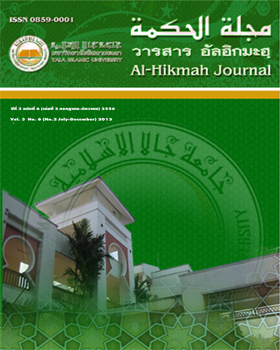Self Management and Family Coping Toward a Happy Warm Family of Muslim Married Female Teachers: a Case Study of Yala Province
Keywords:
Happy Family, Self Management, Family Management, Muslim Female Women TeachersAbstract
This research is a qualitative case study research. The research aimed to find out meaning and elements of a happy warm family as perceived by Muslim married female teachers and to find out conditions associated with self-management and their management within the family that leading to a happy family. Three Muslim female teachers in some certain areas of three southern border provinces of Thailand were selected through purposive sampling technique. The samples must be married for more than 5 years and have at least 1 child in the family. The in-depth interview and content analysis were used for data collection and data analysis respectively.
The research found out happy family as perceived by Muslim female teachers is based on the Islamic teachings and leading the Islamic way of life. Happy family consists of two elements; the emotional ties of family and the behavioral expression, including delineating clear role and responsibilities, spending enjoyable-time together, communication in the family, religious orientation, interactions between the family members, expression of love in the family and encouraging the public mind.
The conditions associated with self-management of Muslim married female teachers that lead to a happy family consist of the internal causes, i.e. leadership traits and self-discipline and the external causes, i.e. good role model of the family members, gender role development in childhood and effective time management. As for the conditions related to management within the family, leadership characteristics and self-discipline are found to be the internal causes whereas family planning, family adaptation, religion-based problem solving, child raising methods, adhering the moral principles pertaining to family life and good time management found to be the external causes.
References
ชาย โพธิสิตา. 2548. ศาสตร์และศิลป์แห่งการวิจัยเชิงคุณภาพ. พิมพ์ครั้งที่ 5. กรุงเทพฯ: อมรินทร์พริ้นติ้งฯ.
มัสลัน มาหะมะ. 2552. แต่งงานง่าย ซินายาก. มูลนิธิเพื่อการศึกษาและการพัฒนาสังคม.รัตนา จันทร์เทาว์ และ วงศ์ภินันท์วัฒนา. 2547. การศึกษาพฤติกรรมการสื่อสารในครอบครัวเพื่อเสริมสร้างความเข้มแข็งของครอบครัวชนบทอีสาน. รายงานการวิจัย. คณะมนุษศาสตร์และสังคมศาสตร์มหาวิทยาลัยขอนแก่น.
สถาบันดำรงราชานุภาพ. 2553. การบริหารเวลา (Time Management): เอกสารความรู้ สดร.ลำดับที่ 17 ปีงบประมาณ 2553. กรุงทพฯ: สำนักงานปลัดกระทรวงมหาดไทย. หน้า 3-5.
สำนักงานกิจการสตรีและสถาบันครอบครัว กระทรวงการพัฒนาสังคมและความมั่นคงของมนุษย์. 2547. นโยบายและยุทธศาสตร์การพัฒนาสถาบันครอบครัว พ.ศ. 2547-2556. กรุงเทพฯ: สำนักงานฯ.
Curtin, R.B., Mapes, D., Schatell, D., & Burrows-Hudson, S. (2003). Self-management in patients with end stage renal disease: Exploring domains and dimensions. NephrologyNursing Journal. 32 (4). 389-395.
Kristin A.Moore. et al. 2002. Preliminary Research on Family Strengths. Baltimore. Maryland.
Maria Krysan et al. 1990. Identifying Successful Families: An Overview of Constructs and
Selected Measures. U.S.Department of Health and Human Services Assistant ecretary for Planning and Evaluation.
มัสลัน มาหะมะ. 2550. อิสลามวิถีแห่งชีวิต. สืบค้นเมื่อ 9 ตุลาคม 2554, จาก
http://www.islammore.com/main/content.php?page=sub&category=47&id=1004



